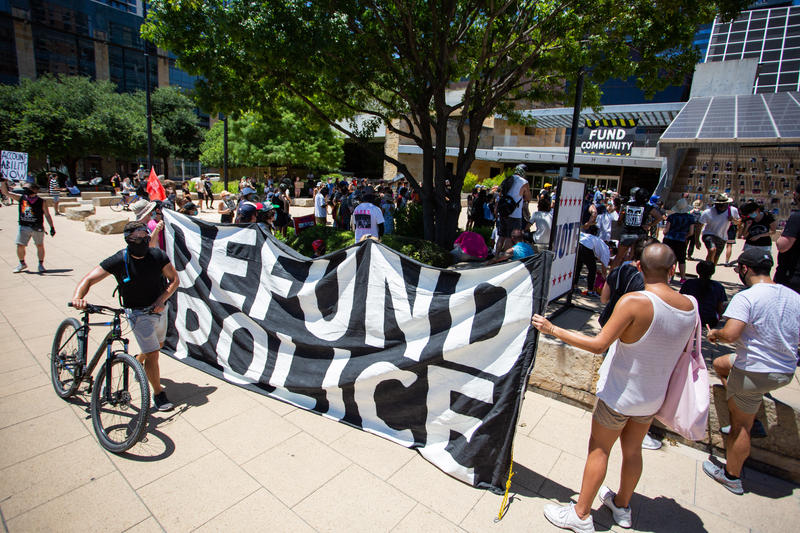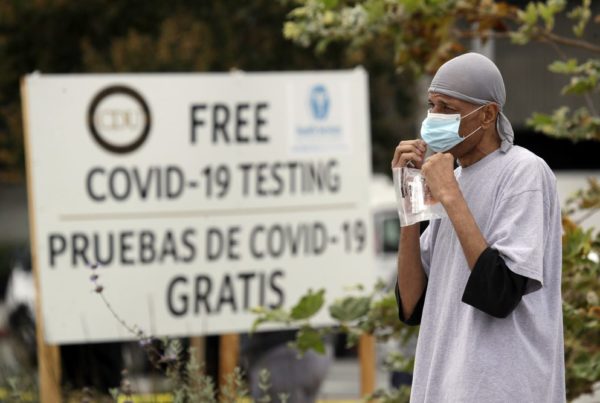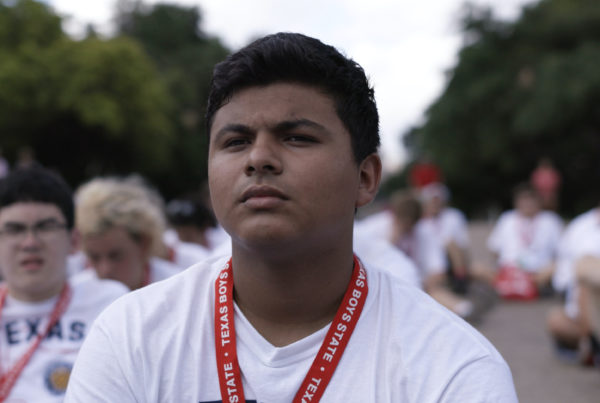Update as of 2:23 p.m. CST, from KUT:
Austin is immediately cutting $20 million from the city’s police budget – and council members are vowing to make bigger reductions in the coming year.
“I think this is without a doubt the most significant change in Austin’s public safety priorities in generations,” Council Member Greg Casar said after Thursday’s unanimous vote. “This moment is something that’s been borne out of a lot of hurt in the community. … There’s so much more that we know our community is asking for.”
Original story from KUT:
Austin City Council members are proposing cuts to the Austin Police Department budget totaling roughly $149 million, or 34% of the department’s current budget.
Council members are scheduled to vote on the city’s budget for the upcoming fiscal year no later than Friday.
The proposal, posted to the City Council message board Friday afternoon by Council Member Greg Casar, attempts to incorporate ideas council members have discussed over the past few weeks during hours-long budget meetings. Nearly three-fourths of the council members say they support it.
About a fifth of the money – just over $22 million – would be immediately transferred to other city departments, including Austin Public Health and Austin-Travis County Emergency Medical Services.
Council members have also recommended that nine divisions of the police department, including 911 operations and victim services, be moved to other city departments or be made into their own offices. Doing that would amount to a $79.5 million reduction in police funding.
Another $47 million would go into a holdover pot of money, which council members would decide over the next year how to spend. This chunk of funding covers several other divisions currently under police, such as the traffic enforcement and mounted patrol, that the council could decide to reduce funding for and/or make into standalone departments.
“The goal of the proposal is to immediately reinvest dollars into the safety and well being of Austin, while also committing ourselves to long-term change,” Casar wrote on Friday.
The $149 million in suggested cuts diverges greatly from the budget City Manager Spencer Cronk proposed to council members last month, which included a roughly $150,000 reduction in funding for police.
Hundreds of Austinites told council members they were insulted by this initial proposal, particularly after police seriously injured demonstrators protesting against systemic racism at the end of May. APD’s budget makes up roughly 40% of the general fund, which is the portion of the budget dedicated to core operations, such as libraries and parks.
“If a budget is a moral document, [City Manager] Spencer Cronk’s current proposal is immoral,” said David Peterson, one of hundreds of people who spoke during a nearly 10-hour public comment period during the hearing on the city’s budget in July.
Council members’ latest proposal gets them closer to what Peterson and many local racial justice organizations have been asking for. The Austin Justice Coalition has demanded the council cut at least $100 million from APD, while other groups like Communities of Color United are advocating for the budget to be cut in half and for the department to be fully dissolved over the next several years.
The aspect of the proposal that would result in the biggest cut to the police budget is canceling the next three upcoming cadet classes, the next of which is scheduled for November.
According to the council members’ document, that would free up nearly $13 million, most of it over several years as the department graduates and hires fewer officers. At a budget meeting last week, Police Chief Brian Manley said putting a hold on training new officers for an entire year would further cripple an understaffed department.
“I do believe this really represents one of the greatest threats to the safety of our community,” Manley said last Tuesday, adding that doing so could bring the number of APD officers down to 2012 staffing levels.
Council members have said they don’t want to train new officers while the department’s training materials are being reviewed; council asked for a review of cadet class materials in December, as part of an audit of alleged bigotry and racism within the department.
Whatever council members vote on later this week, some have cautioned promising big change immediately. Council members pointed to their budget timeline as a challenge. Hundreds began calling for reductions to the police budget in June, and the council typically approves a new budget by August or September.
“I think we all agree we’re not transformatively changing the police department in two weeks for a budget that starts on October 1,” said Mayor Pro Tem Delia Garza at a budget meeting Thursday. “But we need to make commitments to get there.”
That change, council members have said, could come throughout the year as they discuss how to reallocate the $47 million they may put in a holdover fund — moving it out of the police department, but taking time throughout the fiscal year to decide where it should be spent instead.
Council Member Natasha Harper-Madison has proposed approving six months of funding for the police and having the council return in March to figure out how to allocate money for the rest of the fiscal year.
But some citizens are worried that any momentum for change could be lost if the city waits to make substantive cuts to police.
“Moving some money from APD to other places in this way, in this piecemeal way, doesn’t go far enough,” Paula Rojas, a member of Communities of Color United, told KUT on Monday.
The group is advocating for a bigger investment in low-income housing and direct cash assistance to families affected by the coronavirus pandemic.
“This is the year we should have the political will to do this,” she said.
Note: A previous version of this story stated that police funding accounts for 20% of the city budget.














